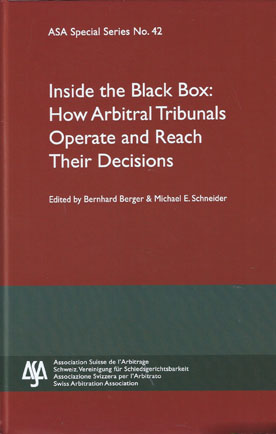
This volume of the ASA Special Series reproduces the transcribed presentations and lively discussions at the ASA Annual Full Day Conference of 1 February 2013 held in Zurich on the topic Inside the Black Box: How Arbitral Tribunals Operate and Reach Their Decisions.
At the Conference, the first Panel was moderated by Julian Lew and joined by Piero Bernardini, David W. Rivkin and Matthias Scherer as panelists. They provided an overview and interesting insights into the organization of the deliberations, the form of the deliberations and the drafting of the award. A lively debate with the audience ensued in particular on the question as to when the deliberations should commence: After the first round of written submissions? Or immediately after the hearing? Or only later when the post-hearing submissions have been received? This debate demonstrated as a pars pro toto that there is and cannot be a "best practice" with regard to the deliberations; it all depends on the circumstances of the case.
The second Panel was composed of Phillip Capper, Bernhard Meyer and Pierre Mayer as panellists and moderated by Markus Wirth. They addressed how to deal with potential conflicts in the deliberations, namely with various forms of bias and obstruction, as well as how to structure what may be called a bargaining process. Somewhat surprisingly, it turned out that, although there are provisions in most arbitration rules to deal with the problems of obstruction and bias, it appears that these are rarely invoked by the other tribunal members in order to resist or defend themselves against inappropriate behaviour of a fellow arbitrator. Are the relevant provisions in the various sets of arbitration rules perhaps wrong or not useful, or should they be revised?
The third Panel brought together Andrea Meier, Hans van Houtte, Zachary Douglas and Geoffrey Senogles as panellists and was moderated by Michael E. Schneider. They provided a detailed overview on various forms of assistance to the arbitral tribunal by third persons (such as tribunal-appointed experts, document production masters, experts’ facilitators, secretaries to the tribunal etc.) and addressed the advantages and dangers involved with the utilisation of such assistants.
On one hand, it turned out from the presentations and discussions on this topic that the picture of the "lone" arbitrator who does all by himself should be put into perspective. On the other hand, it appears that there has emerged a consensus that more transparency with regard to the use of secretaries and other (legal) assistants would be desirable.